Israel has vowed to "intensify" its ground offensive in Rafah, in defiance of global warnings over the fate of hundreds of thousands of Palestinian civilians sheltering in Gaza's far-southern city.
Defence minister Yoav Gallant said "additional forces will enter" the Rafah area and "this activity will intensify".
"Hundreds of targets have already been struck and our forces are manoeuvring in the area," Mr Gallant said following a troop visit yesterday.
The Israeli military has depicted Rafah as the last Hamas stronghold and has ignored warnings from the US and other allies that any major operation there would be catastrophic for civilians.
The UN has said around 600,000 Palestinians have been driven out of the city since the beginning of last week.
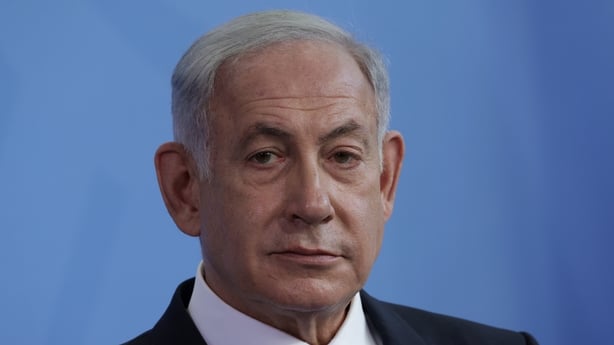
Israeli Prime Minister Benjamin Netanyahu has countered that a ground assault on Rafah is vital to the army's mission of destroying Hamas to prevent any repetition of the 7 October attack that triggered the war.
Speaking yesterday, Mr Netanyahu claimed that nearly half a million Palestinian civilians had already been evacuated from Rafah and argued that a much-feared humanitarian disaster had not materialised.
Many have fled to the coastal area of Al-Mawasi that Israel has declared a "humanitarian zone", and satellite images show a vast new tent city has sprung up near the main southern city of Khan Younis.
Many of those fleeing Rafah are "exhausted, they are scared, they don't have resources", said Javed Ali, head of emergency response in Gaza for International Medical Corps.
Mr Ali, who works at a field hospital in Al-Mawasi and is an aid veteran of multiple war zones, said the situation in Gaza was "far more catastrophic" than anything he had seen before.
"The immense number of trauma cases, the lack of resources, the interrupted supply chain... It's something that I've never seen."
Meanwhile, Palestinian president Mahmoud Abbas told an Arab League meeting in Bahrain that Hamas' "unilateral decision" to launch the 7 October attack had "provided Israel with more pretexts and justifications to attack the Gaza Strip".
In a statement issued after the meeting, the 22-member bloc called for UN peacekeepers to be deployed in the occupied Palestinian territories until a two-state solution has been implemented.
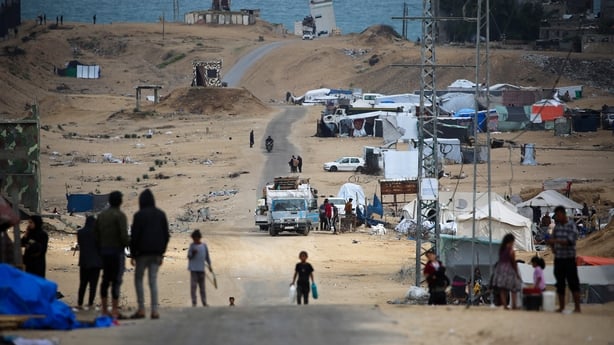
US House votes to force weapons shipments to Israel
The Republican-led US House of Representatives has passed a bill that would force President Joe Biden to send weapons to Israel, seeking to rebuke the Democrat for delaying bomb shipments as he urges Israel to do more to protect civilians during its war with Hamas.
The Israel Security Assistance Support Act was approved 224 to 187, largely along party lines. Sixteen Democrats joined most Republicans in voting yes, and three Republicans joined most Democrats in opposing the measure.
The act is not expected to become law, but its passage underscored the deep US election-year divide over Israel policy.
The war broke out after the 7 October attack on southern Israel which resulted in the deaths of more than 1,170 people, mostly civilians, according to an AFP tally of Israeli official figures.
The militants also seized about 250 hostages, 128 of whom Israel estimates remain in Gaza, including 36 the Israeli army said are dead.
Military spokesman Nadav Shoshani said that "we know that there are hostages in Rafah (and) we are operating to create the conditions to bring them home".
Israel's devastating military retaliation has killed at least 35,272 people, mostly civilians, according to the health ministry in Gaza.
Read more: Five Israeli soldiers killed in friendly fire in Gaza, says military
An Israeli siege on Gaza has brought dire shortages of food as well as clean water, medicines and fuel for its 2.4 million people. The threat of famine hangs over parts of the war-ravaged territory.
The arrival of occasional aid convoys has slowed to a trickle since Israeli forces took control last week of the Gaza side of the Rafah crossing.
The US military said it has completed a temporary pier on Gaza's coast, part of a project to ship in relief supplies from the Mediterranean island of Cyprus.
The United Nations said it is finalising plans to distribute aid delivered via the temporary floating pier, but stressed that delivering aid by land is the "most viable, effective and efficient" method.
"To stave off the horrors of famine, we must use the fastest and most obvious route to reach the people of Gaza – and for that, we need access by land now," deputy UN spokesperson Farhan Haq said.
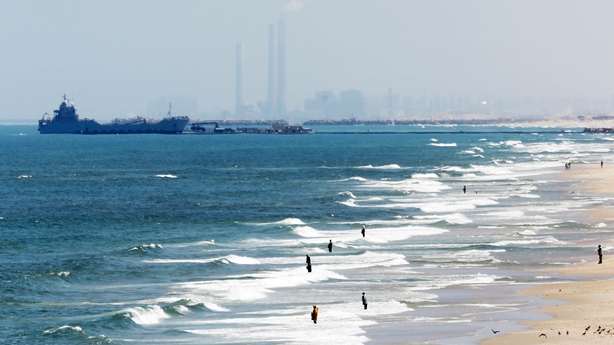
Speaking on RTÉ's Drivetime, Director of Planning at the United Nations Palestinian Refugee Agency (UNRWA) Sam Rose thanked Ireland and the people of Ireland for their support of the organisation and "more importantly", he said, for the people of Gaza.
"It does mean a lot in these very, very dark days and the solidarity is recognised here," he said.
He said more than half of the 600,000 people who have fled Rafah for safety ahead of Israel's planned ground operation are children and many are also elderly people.
Mr Rose said "what has come before in this conflict is a good indicator of what will come next".
UNRWA estimates that between another 300,000 and 400,000 people remain in Rafah, and while some are people who have chosen not to move, others are not able to because "they're sick, infirm, exhausted, they've given up, or they simply don't have the money to gather their belongings and make yet another move to another place."
He said most have been displaced "six or seven times already."
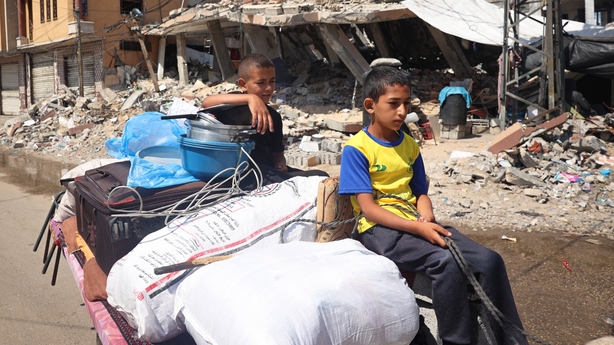
Rafah assault will be 'an unmitigated disaster'
Mr Rose warned Israel's assault on Rafah will be "an unmitigated disaster...with people worn down by seven months of brutal war" and described food insecurity as the worst "anywhere in the world".
He said the UN and aid community is "staying put for now for as long as we can" but the situation, including the closure of border crossings blocking humanitarian relief entering and hospitals in Rafah ceasing to function, means "there's no meaningful service provision able to happen."
He described this as a "political issue, it's not a technical issue...to get these people fed."
Aid lorries are lined up on one side of the border and on another side of the border there is a "first-world country [Israel] with ample supplies of food, agricultural supplies, supermarkets, etc....and unfortunately yet again in the midst of this politics it's the people of Gaza - the children, the women, the elderly who continue to suffer and pay the price".
They feel "abandoned, humiliated, degraded, they feel a real sense of helplessness at the inability or the unwillingness of the powers of the world to fix this," Mr Rose said.
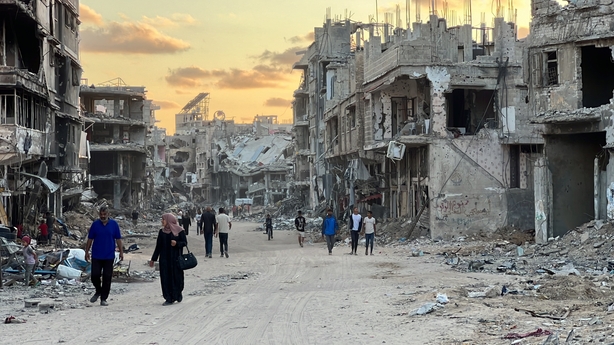
Speaking earlier on RTÉ's Today with Claire Byrne, Chief Executive of Trócaire, Caoimhe de Barra, said no food, fuel, medical equipment or any other supplies have come across the border into Rafah for the last ten days, due to the closure of the Rafah border crossing and the Kerem Shalom crossing.
The World Food Programme (WFP) has run out of food, and fuel will run out in days in Gaza, causing "huge implications", she said.
"Over 600,000 people have fled from Rafah in the last week-and-a-half...these are all people almost entirely who previously have been displaced," she said.
"They're exhausted, many of them are sick, some of them are injured, many of them are elderly, or extremely young."
They are in danger from constant shelling from "air, land, and sea", she said.
She said Trócaire staff and those of other aid agencies are affected in the same way as civilians.
The newly-docked 'aid pier' provided by the US "will not solve these problems", Ms de Barra added.
In a case before the International Court of Justice in The Hague, South Africa accused Israel of stepping up what it called a "genocide" in Gaza, urging the court to order a halt to Israel's assault on Rafah.
"As the primary humanitarian hub for humanitarian assistance in Gaza, if Rafah falls, so too does Gaza," said South Africa in its submission.
"In attacking Rafah, Israel is attacking the 'last refuge' in Gaza, and the only remaining area of the Strip which has not yet been substantially destroyed by Israel," the document added.
Israel, which is due to respond on Friday, has described South Africa's case as unfounded and "morally repugnant".
